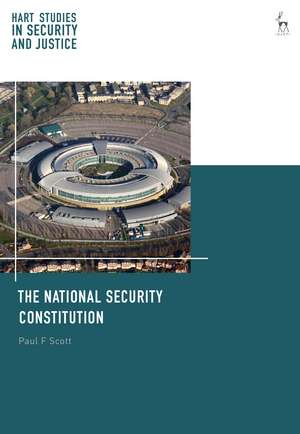The National Security Constitution: Hart Studies in Security and Justice
Autor Paul F Scotten Limba Engleză Paperback – 30 sep 2020
Preț: 347.60 lei
Preț vechi: 477.32 lei
-27% Nou
Puncte Express: 521
Preț estimativ în valută:
66.51€ • 69.45$ • 54.92£
66.51€ • 69.45$ • 54.92£
Carte tipărită la comandă
Livrare economică 15-29 aprilie
Preluare comenzi: 021 569.72.76
Specificații
ISBN-13: 9781509941155
ISBN-10: 1509941150
Pagini: 344
Dimensiuni: 169 x 244 x 25 mm
Greutate: 0.55 kg
Editura: Bloomsbury Publishing
Colecția Hart Publishing
Seria Hart Studies in Security and Justice
Locul publicării:London, United Kingdom
ISBN-10: 1509941150
Pagini: 344
Dimensiuni: 169 x 244 x 25 mm
Greutate: 0.55 kg
Editura: Bloomsbury Publishing
Colecția Hart Publishing
Seria Hart Studies in Security and Justice
Locul publicării:London, United Kingdom
Caracteristici
An in-depth legal analysis of how approaches to the protection of national security have impacted upon the constitutional order of the United Kingdom.
Notă biografică
Paul F Scott is Lecturer in Public Law at the University of Glasgow.
Cuprins
Introduction: The Constitution and National Security I. The United Kingdom's Constitutional Order II. The National Security Constitution III. Structure IV. The National Security Council 1. The Counter-Terrorism Constitution I. Introduction II. CONTEST and the Joint Terrorism Analysis Centre III. The Role of the Criminal Law in Counter-Terrorism IV. Counter-Terrorism Law up to and Including the Terrorism Act 2000 V. The 2000 Act and the Definition of Terrorism VI. Obsolete Counter-Terrorism MechanismsVII. Current Counter-Terrorism Mechanisms VIII. Themes of the Counter-Terrorism Constitution IX. Conclusion 2. Investigatory Powers and the Constitution I. The Constitution and Investigatory Powers II. The Rule(s) of Law III. Investigatory Powers IV. Conclusion 33. The Military Constitution I. Introduction II. The Place of the Military in the Constitution III. The Use of Force in Constitutional Law and Practice IV. Legal Accountability for the Use of Force Abroad V. Drones VI. Conclusion 4. Citizenship I. Introduction II. Citizenship and the Right to Travel III. Immigration Law and National Security IV. Citizenship and National Security V. Citizenship, Passports and the Right to Travel VI. Conclusion 5. Secrecy I. Secrecy in the National Security Constitution II. Secrecy in the Courts III. Executive Secrecy IV. Conclusion: Secrecy in the National Security Constitution 6. Justiciability I. Introduction II. Justiciability (and Foreign Affairs) Generally III. Foreign Act of State IV. Crown Act of StateV. Conclusion: The Courts and the Executive in the National Security Constitution 7. Sovereignty I. Introduction II. From National Security to International Security III. The International Pursuit of National Security and its Consequences IV. Conclusion: The Constitutional Consequences of the Internationalisation of National Security









